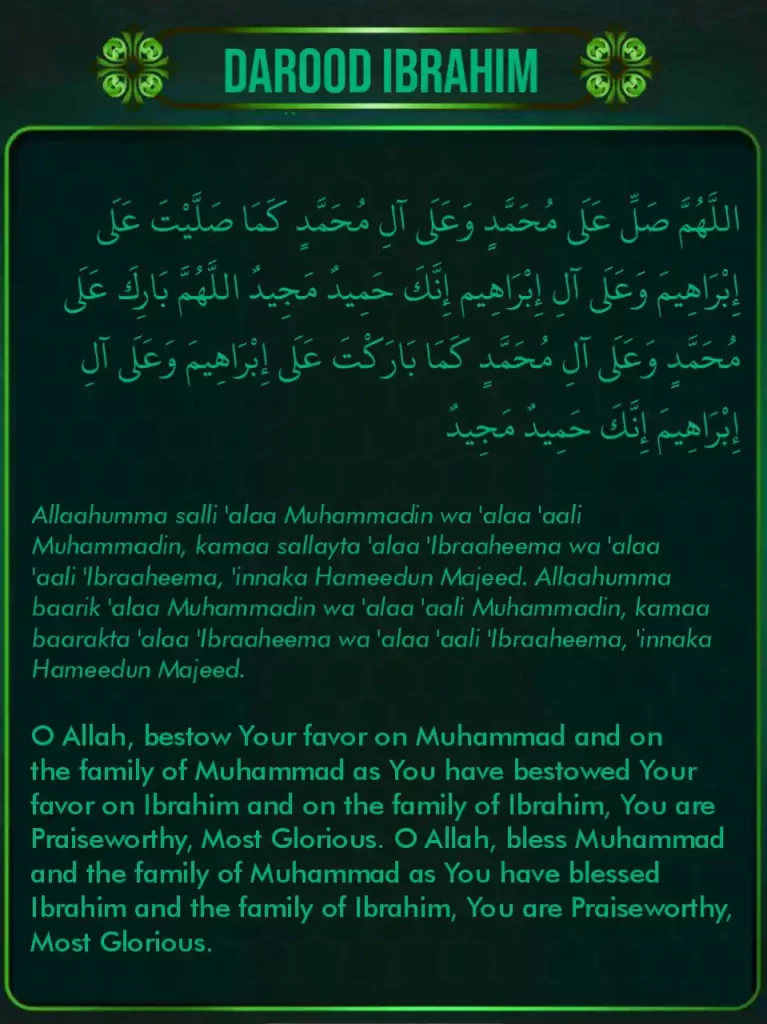Durood Ibrahim in Arabic, Transliteration, Benefits And Meaning In English
Durood Ibrahim, commonly known as Salatul Ibrahimiyyah is a prayer upon the Prophet SAW that was revealed by the Prophet himself.
Advertisements
It has been related in various hadith books such as Bukhari and Muslim where it is mentioned that it is the best and most complete form of salutation upon the Prophet SAW. It is usually recited in salah after reciting tashahhud whilst in the sitting position.
There are a number of different wordings of the prayer; you can check the most common ones here.
Durood Ibrahim Arabic
اللَّهُمَّ صَلِّ عَلَى مُحَمَّدٍ وَعَلَى آلِ مُحَمَّدٍ كَمَا صَلَّيْتَ عَلَى إِبْرَاهِيمَ وَعَلَى آلِ إِبْرَاهِيم إِنَّكَ حَمِيدٌ مَجِيدٌ اللَّهُمَّ بَارِكَ عَلَى مُحَمَّدٍ وَعَلَى آلِ مُحَمَّدٍ كَمَا بَارَكْتَ عَلَى إِبْرَاهِيمَ وَعَلَى آلِ إِبْرَاهِيمَ إِنَّكَ حَمِيدٌ مَجِيدٌ
Darood Ibrahim transliteration
Allaahumma salli ‘alaa Muhammadin wa ‘alaa ‘aali Muhammadin, kamaa sallayta ‘alaa ‘Ibraaheema wa ‘alaa ‘aali ‘Ibraaheema, ‘innaka Hameedun Majeed. Allaahumma baarik ‘alaa Muhammadin wa ‘alaa ‘aali Muhammadin, kamaa baarakta ‘alaa ‘Ibraaheema wa ‘alaa ‘aali ‘Ibraaheema, ‘innaka Hameedun Majeed.
Advertisements
Durood Ibrahim in Meaning English
The meaning of darood Ibrahim is O Allah, bestow Your favor on Muhammad and on the family of Muhammad as You have bestowed Your favor on Ibrahim and on the family of Ibrahim, You are Praiseworthy, Most Glorious. O Allah, bless Muhammad and the family of Muhammad as You have blessed Ibrahim and the family of Ibrahim, You are Praiseworthy, Most Glorious.

Benefits of Darood E Ibrahim
- You are following the command of Allah.
- Conformity with Allah sending blessing upon him.
- Conformity with the angels sending blessings.
- Gain 10 blessings from Allah.
- Ten levels are raised for the servant.
- Ten good deeds are written for the servant.
- Ten sins are erased from the servant.
- Dua is accepted if preceded with salah on the Prophet.
- Intercession of the Prophet.
- A means for forgiveness of sins.
- Allah will suffice the servant.
- Closeness to the Prophet on the Day of Judgement.
- Reward of charity.
- A means of the fulfilment of your needs.
- Allah and His angels send blessings upon the servant.
- A means of cleansing and purification.
- Glad tidings of Paradise before death.
- Protection from the terrors of the Day of Judgement.
- The Prophet responds to him.
- A means for the servant to remember what he has forgotten.
- A means of blessings on the gathering and lack of regret on the Day of Judgement.
- A means to repel poverty.
- It repels the description of being a miser. Protection from the Prophet’s curse.
- Leads to the path towards Paradise.
- A protection from the stench of a gathering where Allah and His Prophet are not mentioned.
- It completes speech, after Allah’s praise.
- Abundance of light on the Sirat.
- Protection from hardness of the heart.
- Allah bestows favourable praise upon the servant.
- A source of blessings for the servant himself.
- A means of receiving Allah’s mercy.
- A means to continuously love the Prophet.
- A means of the Prophet continuously loving the servant.
- A means of guidance and a ‘living’ heart.
- The servant’s name is presented to the Prophet.
- The servant’s feet will be firm on the Sirat.
- The servant fulfils a small portion of the Prophet’s right.
- Comprises gratitude to Allah.
- It is a dua.
(Adapted from Jala’ al-Afham by Ibn al-Qayyim)
How To Recite Durood Ibrahim
Here is how to recite Durood Ibrahim in this video,
‘Surely, Allah and His angels send salaat upon the Prophet. 0 you who believe, send salaat upon him and salute him with a salutation of peace.’
Surah Ahzab 56
The Command to Send Salaat upon the Prophet SAW
This signifies that Allah, Most High, bestows His mercy on His Prophet SAW. He magnifies his dignity and exalts his station, and that His angels pray for the Prophet SAW and seek Allah’s mercy for him.
Advertisements
They pray to Allah to honour His servant and His Messenger and to give him the highest of all degrees.
The blessings come from Allah, as do His mercy and His Good Pleasure, while from the angels comes the prayer of supplication and the request for Allah’s Mercy.

Sending Salaat upon the Prophet
That is to say, the believers must make it their frequent practice to send salaat upon the Prophet SAW and salute him with the greeting of peace.
Advertisements
In fact, his claim on us is enormous. He has delivered us from error into right guidance and brought us out of darkness into light.
Whenever his noble name is mentioned, we must, therefore, say, ‘0 Allah! Send salaat and salaam upon him.’
When the believers invoke salaat upon the Prophet SAW, they honour themselves thereby, since they are following the example of Allah in blessing and venerating him.
Since creatures are incapable of recompensing Allah’s Messenger SAW for all of the good that he has delivered, they must entreat Allah to recompense him.
Allah, Most High, has commanded His servants to send salaat upon His Prophet Muhammad SAW as a way of honouring him.
It is, however, recommended to invoke Allah’s peace upon other prophets and angels, separately, whenever their names are mentioned.
Muslim scholars have expressed a difference of opinion as to the extent to which it is necessary to invoke salaat upon the Prophet.
Some maintain that it is required whenever the name of the Messenger SAW is mentioned. Their view is supported by prophetic traditions.
According to some other scholars, it is necessary to do so in every session, though only once, even if he is mentioned repeatedly.
Caution must, however, be exercised when it comes to being neglectful with sending salaat upon every mention of Allah’s Messenger.
This is in keeping with all the reports that have been transmitted on this subject.
Merits of Sending Salaat upon the Prophet SAW
Concerning the merit of sending salaat upon the Prophet SAW, he himself said,
‘If someone sends salaat upon me once, Allah will send salaat upon him, ten times.’ (Muslim and at-Tirmidhee)
At-Tirmidhee recorded that Ubayy ibn Ka’b once said to Allah’s Messenger’ ‘Messenger of Allah, I send a lot of salaat upon you, how much of my supplication should I reserve for sending salaat upon you?’
The Prophet replied, ‘Whatever you want. But if you increase it, it would be better for you.’ I said, ‘Two-thirds?’ He said, ‘Whatever you want. But if you increase it, it would be better for you.’ I said, ‘Should I make my whole supplication for you?’ He said, ‘This would be sufficient to relieve your worries and earn you forgiveness of your sins.’ (at-Tirmidhee)
When To Send Salaat upon the Prophet SAW
It is reported that we should send salaat upon the Prophet SAW on various occasions, such as following the call to prayer (adhaan).
lmaam Ahmad records, ‘Allah’s Messenger SAW said, “When you hear the· mu’adhdhin, repeat what he says, then send salaat upon me; for whoever sends salaat upon me, Allah will send salaat upon him tenfold.
Then ask Allah to grant me al-Waseelah, which is a status in Paradise to which only one of the servants of Allah will be entitled, and I hope that I will be the one.
Whoever asks for al-Waseelah for me, it will be permitted for me to intercede for him.”‘
Other occasions when we should send salaat upon the Prophet SAW include while concluding our supplications.
Sending Salaat upon the Prophet before Making Dua
Allah’s Messenger SAW once heard a man making prayer of supplication. As the man did not praise Allah or send salaat upon the Prophet, Allah’s Messenger said, ‘The man is rushing.’
Then he called him over and said, ‘When anyone of you supplicates, let him start by praising and glorifying Allah, then let him send salaat upon the Prophet, and after that let him make supplication as he wishes.’ (Ahmad and Abu Daawood)
It is also recommended to send salaat often upon the Prophet on Fridays.
lmaam Ahmad records, ‘The Messenger of Allah said, “One of the best of your days is Friday. On it Adam was created, and on it his soul was taken, and on it the Trumpet will be blown.
Therefore, increase in sending your salaat upon me, for your salaat upon me will be presented to me.”
They said, “Messenger of Allah! And how will our salaat upon you be presented to you after you have perished?”
He replied, “Indeed, Allah has prohibited the earth from consuming the bodies of the prophets.”‘ (Ahmad, Abu Daawood and an-Nasaa’ee)
Forms of Sending Salaat upon the Prophet
The forms of sending salaat upon the Prophet are many. They are recorded in the authentic books of hadeeth, like al-Bukhaaree, Muslim, Abu Daawood, at-Tirmidhee, an-Nasaa’ee, and Ibn Maajah.
Many Muslims refer to this form as Salatul Ibrahimiyyah (among other darood) meaning that which we recite in our daily prayers.
You must try hard to make a constant practice of sending salaat upon the Prophet as many times as possible.
Allah says in the Glorious Qur’an, ‘Say: If you love Allah, follow me; Allah will love you and forgive you your sins.’ (3: 31)
This is quite miraculous that Allah, Most High, should make the love for His servants dependent on following Allah’s Messenger and that He should make following him a proof of the genuineness of the servant’s love for Allah.
If the servants do not follow him, they will deprive themselves of the love of Allah. They will be false in claiming to love Him, and likewise in claiming to love the Messenger of Allah.
We pray to Allah, through His gracious favour and His noble generosity, to shower plentiful salaat and peace upon Allah’s Messenger.
We pray to Him to enable us to follow His Messenger at heart, in spirit, in private, and both inwardly and outwardly. Allah is indeed Capable of whatever He Wills. There is no might nor any power except with Allah.
Advertisements








One Comment